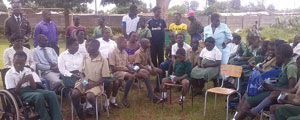
CHILDREN with disabilities are mostly at risk of neglect, discrimination, abuse and most of them are denied access to basic human rights such as education.
Vimbai Marufu/Molline Muchemwa
Last week this paper carried out a heart-rending story of a 15 year-old mentally challenged girl who was allegedly raped several times by her father’s friend.
It was the state’s case that Clemence Galau (33) of St Marys Township in Chitungwiza allegedly raped a special class schoolgirl who suffered from brain damage. The court heard that upon raping her several times he told her not to tell anyone, gave her $1 and promised to marry her.
This incident goes to show the plight of disabled children and how they are subject to profound levels of discrimination and abuse. Gladys Mushambi a teacher at Batsirai, a school that focuses on the education and grooming of children with disabilities, said the girl child with intellectual, mental and sensory disabilities are more at risk as they cannot easily tell of the abuse.
“These children suffer a great deal, but do not open easily and at times they cannot realise they are being abused.
“Here at Batsirai we had such cases of abused children and we have made it our priority to candidly discuss such issues with children so they can feel at ease and open up,” said Mushambi.
According to a report made by Save the Children Norway, 87% of girls with disabilities are being sexually abused in Zimbabwe. Among them 48% were mentally challenged, 15,7% had hearing impairment, 25,3% had visible physical disabilities and half of these sexually abused girls tested HIV positive.
- Chamisa under fire over US$120K donation
- Mavhunga puts DeMbare into Chibuku quarterfinals
- Pension funds bet on Cabora Bassa oilfields
- Councils defy govt fire tender directive
Keep Reading
Mushambi, who was inspired to become a special school teacher by her sister’s child who had cerebral palsy, added that the school dedicates a lot of time with the children to discuss health issues and abuse.
Batsirai Special School, which is registered as a welfare organisation, was opened in 1984 and is situated in Dzivarasekwa, Harare. It has become a safe haven for children with disabilities from many surrounding communities.
Mushambi added that apart from teaching health issues, the school also offers tailor-made educational programmes to suit the unique needs of the children.
“They need all the love and patience as most of them come here not knowing how to even wash their hands, but we use an individual education plan where we teach them according to their needs.
“We resolutely seek to educate them through imparting social skills, particularly self-help, communication, pre-vocational training and functional basics so they can be independent. We have had many success stories and some of them are now even employed,” said Musambi.
Loreta Chikengezha (18) a student at the school who wants to become a dressmaker, said the school programmes had enhanced her self-esteem and the place provided her with a sense of belonging as everyone was friendly.
“I enjoy being with my other schoolmates here than being anywhere else and my teachers have helped me to become more confident,” said Loreta.
Tadiwa Mashiri (17) an A-level student at St Georges College who is doing community work at Batsirai Special School as part of their school programme, said the way the teachers monitors each child’s progress is really beneficial to the children.
“By working here with these children I have realised that the system they use makes sure that no child is ignored as they deal with each child individually and monitor the progress before moving them to the next class.
“Being disabled does not necessarily mean you are not part of society, in most cases they are treated as outcasts, but what I have realised is that these children love to interact with people, if only society could love them back,” said Tadiwa.
However, the school is in need of a borehole, funds to run projects like chicken rearing and a proper home economics block for the children to conduct their practical lessons.











